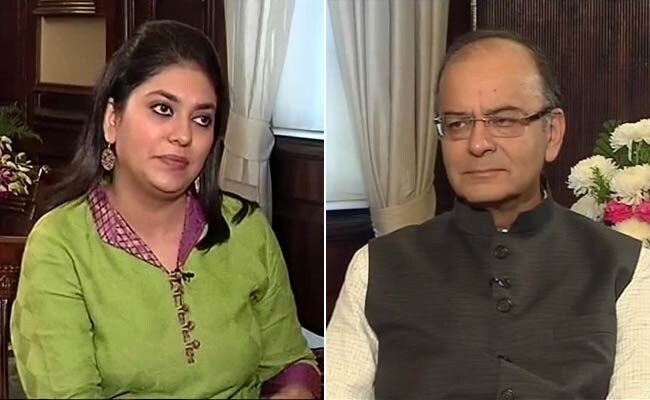
Mr Jaitley has said that he hopes an April 1, 2016 deadline for the GST will still be met, though that appears highly unlikely.
New Delhi:
The government's emphatic defeat in Bihar will not impede its commitment to economic reforms including the long-awaited national sales tax, Finance Minister Arun Jaitley told NDTV today in an exclusive interview.
The BJP's big defeat in the Bihar election has hiked fears of a slowdown in the government's agenda. The party, whose campaign was fronted by Prime Minister Narendra Modi, won just 53 of the state's 243 seats, with the partnership of Lalu Yadav and Nitish Kumar amassing 178, to give Mr Kumar a third consecutive term as Chief Minister.
The GST would replace an array of state and central levies and transform India into a more uniform market. Economists estimate that could add up to 2 percentage points to gross domestic product. "If Nitish Kumar is a responsible leader, he will support GST. Bihar needs more revenue," the Finance Minister said. "His party has supported GST. I don't see any reason why his party will change position on GST. If it does, it will have to explain the reason."
But after the government's big setback in Bihar, Opposition parties are expected to step up efforts to derail the Modi government's plans to push promised economic reforms through Parliament when the winter session begins on November 26. In the last session, the Goods and Services Tax, or GST, was cleared by the Lok Sabha, but Opposition parties led by the Congress halted its passage in the Rajya Sabha, where the government is in a minority.
"I think GST will get through. It's only a matter of time. Therefore, for the Congress also to indefinitely assume an obstructionist indefinitely may not be so possible. The country's mood is reform-oriented. India has become highly aspirational in terms of its aptitude for change and growth," Mr Jaitley told NDTV today.
Elections like the one in Bihar are also crucial because the Rajya Sabha's membership is based on parties' strength in state assemblies.
The GST is now being studied by a parliamentary committee, which puts a crucial reform on hold because the government was unable to collate political support.
Mr Jaitley has said that he hopes an April 1, 2016 deadline for the GST will still be met, though that appears highly unlikely.
Mr Modi, whose one-man leadership style has been much scrutinized, won over legions of voters at the general election last year, promising sweeping reforms to revive the faltering economy.
Growth is now purring along at seven percent.
But complaints have been mounting about his failure to nail down major reforms to boost investment and help create jobs.
The BJP's big defeat in the Bihar election has hiked fears of a slowdown in the government's agenda. The party, whose campaign was fronted by Prime Minister Narendra Modi, won just 53 of the state's 243 seats, with the partnership of Lalu Yadav and Nitish Kumar amassing 178, to give Mr Kumar a third consecutive term as Chief Minister.
The GST would replace an array of state and central levies and transform India into a more uniform market. Economists estimate that could add up to 2 percentage points to gross domestic product. "If Nitish Kumar is a responsible leader, he will support GST. Bihar needs more revenue," the Finance Minister said. "His party has supported GST. I don't see any reason why his party will change position on GST. If it does, it will have to explain the reason."
But after the government's big setback in Bihar, Opposition parties are expected to step up efforts to derail the Modi government's plans to push promised economic reforms through Parliament when the winter session begins on November 26. In the last session, the Goods and Services Tax, or GST, was cleared by the Lok Sabha, but Opposition parties led by the Congress halted its passage in the Rajya Sabha, where the government is in a minority.
"I think GST will get through. It's only a matter of time. Therefore, for the Congress also to indefinitely assume an obstructionist indefinitely may not be so possible. The country's mood is reform-oriented. India has become highly aspirational in terms of its aptitude for change and growth," Mr Jaitley told NDTV today.
Elections like the one in Bihar are also crucial because the Rajya Sabha's membership is based on parties' strength in state assemblies.
The GST is now being studied by a parliamentary committee, which puts a crucial reform on hold because the government was unable to collate political support.
Mr Jaitley has said that he hopes an April 1, 2016 deadline for the GST will still be met, though that appears highly unlikely.
Mr Modi, whose one-man leadership style has been much scrutinized, won over legions of voters at the general election last year, promising sweeping reforms to revive the faltering economy.
Growth is now purring along at seven percent.
But complaints have been mounting about his failure to nail down major reforms to boost investment and help create jobs.
Track Latest News Live on NDTV.com and get news updates from India and around the world

